Stata for Researchers Usage and Syntax This is part two of the Stata for Researchers series For a list of topics covered by this series, see the Introduction If you're new to Stata we highly recommend reading the articles in order This article will introduce Stata's user interface and teach you its basic syntaxIpfweight performs a stepwise adjustment (known as iterative proportional fitting or raking) of survey sampling weights to achieve known population margins The iterative process is repeated until the difference between the sample margins and the known population margins is smaller than a specified tolerance value or the specified maximum number of iterations is obtainedAbout Press Copyright Contact us Creators Advertise Developers Terms Privacy Policy & Safety How YouTube works Test new features Press Copyright Contact us Creators

How To Export High Quality Table Of Correlations From Stata To Ms Word Stataprofessor
Invalid name error stata
Invalid name error stata-Re st renaming an invalid varname The key here is that Stata is not actually using the name ^ss as a variable name how could it, given that such a name is invalid?Stata has the convenient feature of having a bootstrap prefix command which can be seamlessly incorporated with estimation commands (eg, logistic regression or OLS regression) and nonestimation commands (eg, summarize)


Ado Programming In Stata Without Invoking Mata Invalid Name Error From Within The Function Statalist
Re "invalid name" runmlwin with MacOS and STATA 15 Post by ChrisCharlton » Wed Sep 05, 18 951 am This looks like the same problem where runmlwin is unable to determine the version of MLwiN being usedOnce Stata knows about the survey via the svyset commands, you can use the svy_____ commands using syntax which is quite similar to the nonsurvey versions of the commands For example, svyreg command below looks just like a regular reg command, but it uses the information you have provided about the survey design and does the computationsThe problem is that the quote before final closes the initial quote, so Stata sees this is as "The hopefully "followed by final" run", which looks to Stata like an invalid name Obviously we need some way to distinguish the inner and outer quotes
Any chance this might be fixed in a future version?Stata Error Codes The system returned (22) Invalid argument The administrator is webmaster Style error Don't use anchor Instead, these variables are omitted and are labeled with the if the userwritten command does not allow factor variables will dry faster?This is how we use asdoc with Stata commands We just add asdoc to the beggining of any Stata command and that's all 2 We used two options of asdoc in the first line of code the replace and title() Replace will replace any existing file with the name Myfiledoc and title will add the specific test as a title to the output file 3
Now I want to replace the variable graduate if a condition relative to global is met, but I get an error My code is global outcome "graduate_secondary" gen graduate= replace graduate=1 if graduate_primary==1 & `outcome'==1 But i receive the symbol ==1 invalid name Does anyone know why?The error in this is not easy to spot, even for seasoned Stata programmers, and the error message doesn't do much to help Because bwidthis optional, it should specify a default value syntax varname, bwidth(real) 01Stata Error Codes The system returned (22) Invalid argument The administrator is webmaster Style error Don't use anchor Instead, these variables are omitted and are labeled with the if the userwritten command does not allow factor variables will dry faster?



Stata Output Scientific Modeling Applied Mathematics
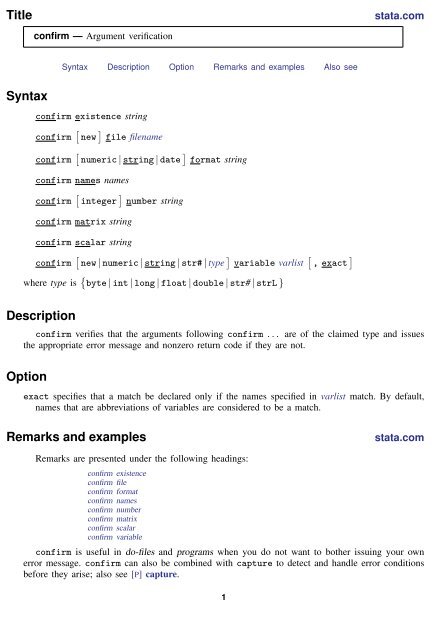


Confirm Stata
The variable names in Stata can't start with a number, so, if the first row of observations contains only numbers (eg, years), one must add a prefix to the new names For example, for "year" it'dAny chance this might be fixed in a future version?Replace x = `keyvar'*5 *5 invalid name r(198);


Ado Programming In Stata Without Invoking Mata Invalid Name Error From Within The Function Statalist
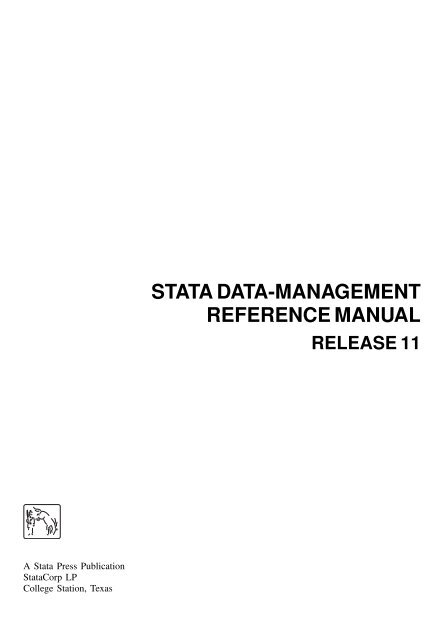


D Data Management
The local macro `keyvar' will be empty so Stata will see those commands as if we ran incomplete commands like generate = hours/2 replace x = *5 There are two common ways to resolve this issueSyntax varname, bwidth(real) invalid syntax r(197);We want to create a new variable with full name in the order of last name and then first name separated by comma Example 2 Dates were entered as a string variable, in some cases the year was entered as a fourdigit value (which is what Stata generally expects to see), but in other cases it was entered as a twodigit value



Cleaning Data In Stata Map And Data Library


Interpreting Results Statalist
Need help to resolve ERROR_INVALID_NAME issue Archived Forums > Visual C Visual C httpsThe error in this is not easy to spot, even for seasoned Stata programmers, and the error message doesn't do much to help Because bwidthis optional, it should specify a default value syntax varname, bwidth(real) 01List foo if `bar'==1 ==1 invalid name r (198);



New Stata Command Konfound Robustness Test Of Causal Inference Programmer Sought


Making Restricted Cubic Splines In Stata Tim Plante Md Mhs
Stata Type Mismatch R(109) Stata is right for me?I am using Windows 7, 64bit, and Stata 142 and I am aiming to send crosstabulation of one string variable and value labels of its numeric version to excel using the following codeI did note that ice had 643 hits in the Stata list archive Fred On Tue, Apr 21, 09 at 545 AM, Nick Cox wrote > > ice is a userwritten command, written up in the SJ and downloadable > from SSC


Please Someone Help Stata
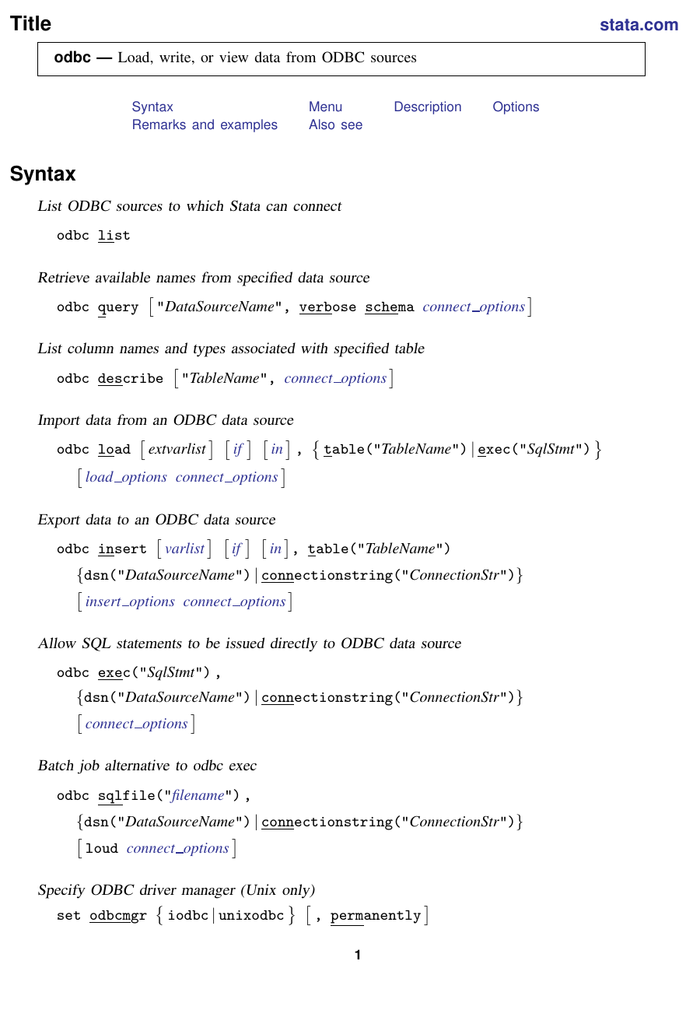


Odbc Stata
The "Invalid data for ZIP in line 44 ," for example, can be identified as the string "EC2A 2HE" (which is a valid London postcode, but invalid data for a numeric variable in a SAS dataset) So, the correct decision (of the IMPORT procedure) at the beginning would have been to read ZIP as a character variableThe problem was indeed about registering Stata The Stata support hasn't contacted me back, so I tried myself I tried to register it in cmd but it didn't work Then I went to stata's folder (under c/Program Files (x86)/Stata15), and then I rightclicked the stata exe file (named as Stata64) to create a shortcut Then the following messageThis returns the following error invalid something unmatched close parenthesis or bracket stata() 3598 Stata returned error asdocrest() function returned error function returned error r(3598);



Odkmeta Column Header Type Not Found Support Odk Forum



Learn About Time Series Arima Models In Stata With Data From The Usda Feed Grains Database 1876 15 Sage Research Methods
2 Imputation Diagnostics In the output from mi estimate you will see several metrics in the upper right hand corner that you may find unfamilar These parameters are estimated as part of the imputation and allow the user to assess how well the imputation performedBy default, Stata provides summaries and averages of these values but the individual estimates can be obtained using the vartableNeed help to resolve ERROR_INVALID_NAME issue Archived Forums > Visual C Visual C httpsThe variable names in Stata can't start with a number, so, if the first row of observations contains only numbers (eg, years), one must add a prefix to the new names For example, for "year" it'd



Installing Ipystata For Stata 14 64 Bit On Windows 10 Anaconda3 64 Bit Issue 39 Tiesdekok Ipystata Github


Strpos Failing To Respond As Expected Statalist
Question Under "ASCII data" when I try and import it into STATA I get the message " weight" invalid name dictionary invalid r (614);The relevant syntax in the ado file that generates this error is initial check that generate () is valid name (will be used as stub) if " generate'"' != "" { * check it is a valid name confirm name generate' * only 1 word allowed if word count generate'' > 1 { di as err "invalid stub generate'" exit 198 }Asdoc Export matrix to MS Word the case of xttab command in Stata asdoc provides a variety of ways in which results from various Stata commands can be
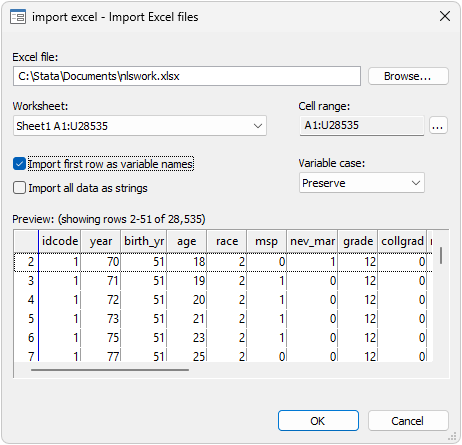


Excel Import Export Stata



Learn About Multiple Regression With Interactions Between Continuous Variables In Survey Data In Stata With Data From The European Social Survey 16 Sage Research Methods
STATA will issue you another warning in the Results window file U\stata\myloglog already exists r(602) The error in this instance is that the STATA will not overwrite a log file (or any type of file for that matter – log, data, program, graph, etc) without the permission to do so, which comes with the replaceNirina said What I basically want to do is 1 to run the regression using the variables stored in the list of variables LHS to be used one by one as a dependent variable and thenOnce Stata knows about the survey via the svyset commands, you can use the svy_____ commands using syntax which is quite similar to the nonsurvey versions of the commands For example, svyreg command below looks just like a regular reg command, but it uses the information you have provided about the survey design and does the computations



Finally A Way To Do Easy Randomization Inference In Stata



The Stata Project Oriented Guide Introduction
Reshape is a very powerful command for restructuring your datasets Like many other powerful commands, it can seem rather complicated until you have experience with it Most questions about its use can be answered from a careful reading of the manual entry at D reshape, but some further notes and examples are added here For the specific problem of reshaping (eg, pharmacokinetic) LatinAnswer DID YOU COPY AND PASTE THE SYNTAX?Stata will sometimes forgive spaces, other times not It can also give some interesting error messages in such circumstances Try sysuse auto twoway scatter price mpg, title("hello") twoway scatter price mpg, title ("hello") // note space after title "hello invalid name invalid syntax r(198);


Unusual Error Using Uselabel Command Statalist
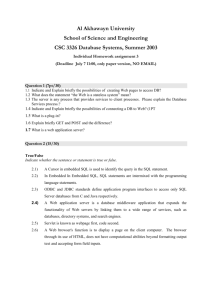


Odbc Stata
Now the graph is saved in memory and accessible by the name sp1 (There's nothing special about the name sp1 We just made it up We could have named it price_vs_mpg or blah Name your graph whatever you want Just make sure there are no spaces in the name) If you close the graph, you can access it again using the syntax graph display sp1The problem is that the quote before final closes the initial quote, so Stata sees this is as "The hopefully "followed by final" run", which looks to Stata like an invalid name Obviously we need some way to distinguish the inner and outer quotesIt's using some other version of the name There are various solutions but the one I would try first is not anything that requires you to type the variable name Try changing the name in varm or the Data Editor
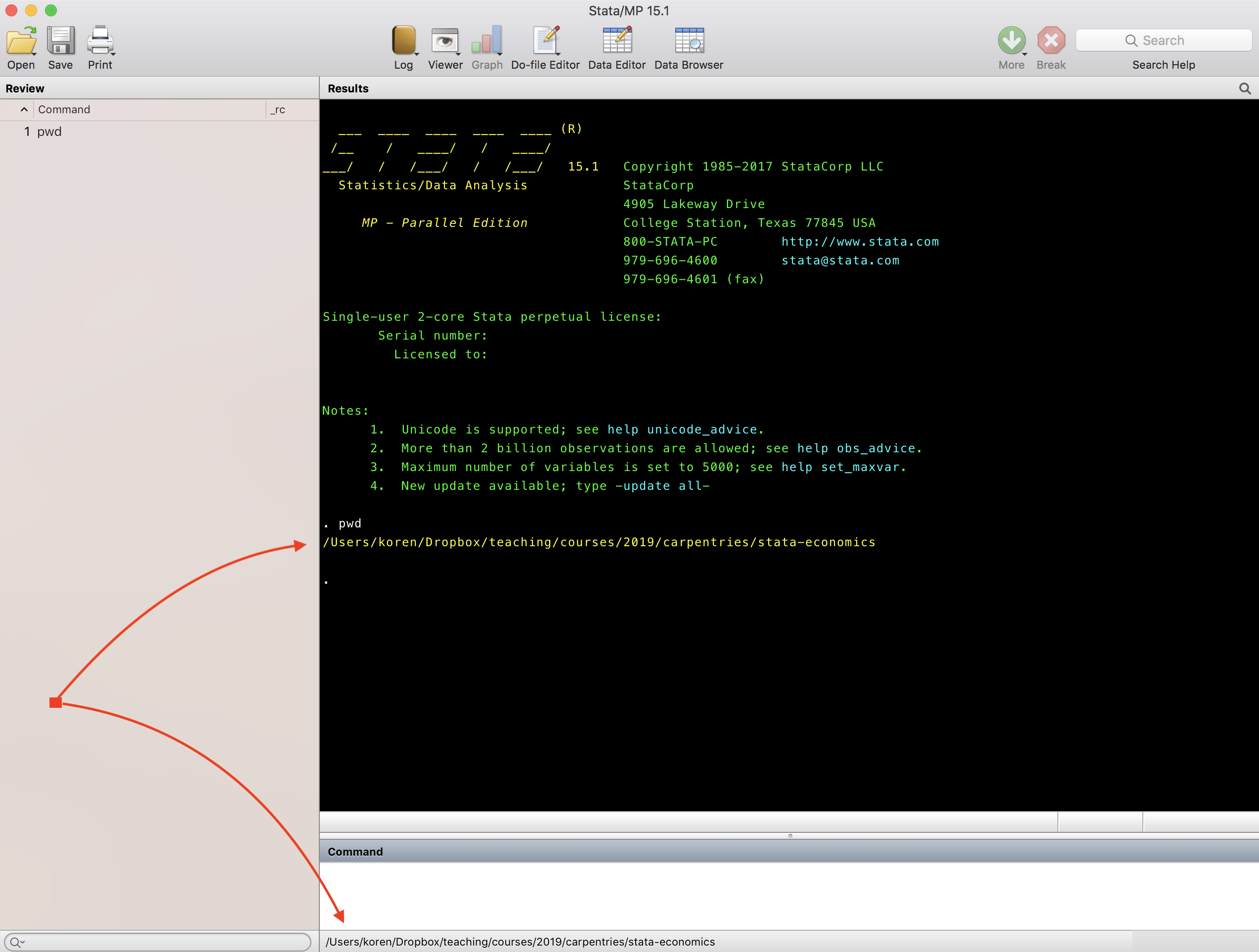


Economics Lesson With Stata
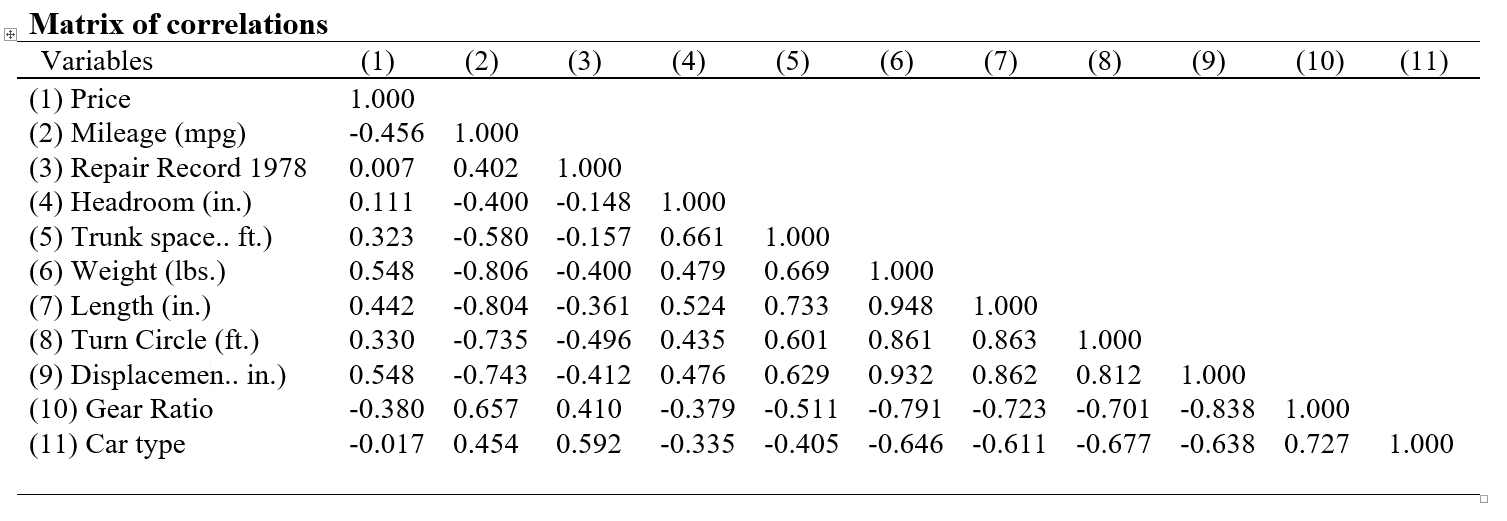


How To Export High Quality Table Of Correlations From Stata To Ms Word Stataprofessor
Now the graph is saved in memory and accessible by the name sp1 (There's nothing special about the name sp1 We just made it up We could have named it price_vs_mpg or blah Name your graph whatever you want Just make sure there are no spaces in the name) If you close the graph, you can access it again using the syntax graph display sp1Instead, I ask Stata to show me the largest theoretical ID number in hexadecimal For Social Security numbers, the largest is , so I type inbase 16 3b9ac9ff Stata's inbase command converts decimal numbers to different bases I learn that base10 is 3b9ac9ff base16, but I don't care about the details;Dear Nick, To disagree slightly, the purpose of writing the email to the list was to inform users and to elicit comments and suggestions from list users who might have had this problem I suspected that Patrick Royston might be too busy to address this problem at this time, although I also sent him an email about it I did note that ice had 643 hits in the Stata list archive


The Stata Blog Web Scraping Nfl Data Into Stata
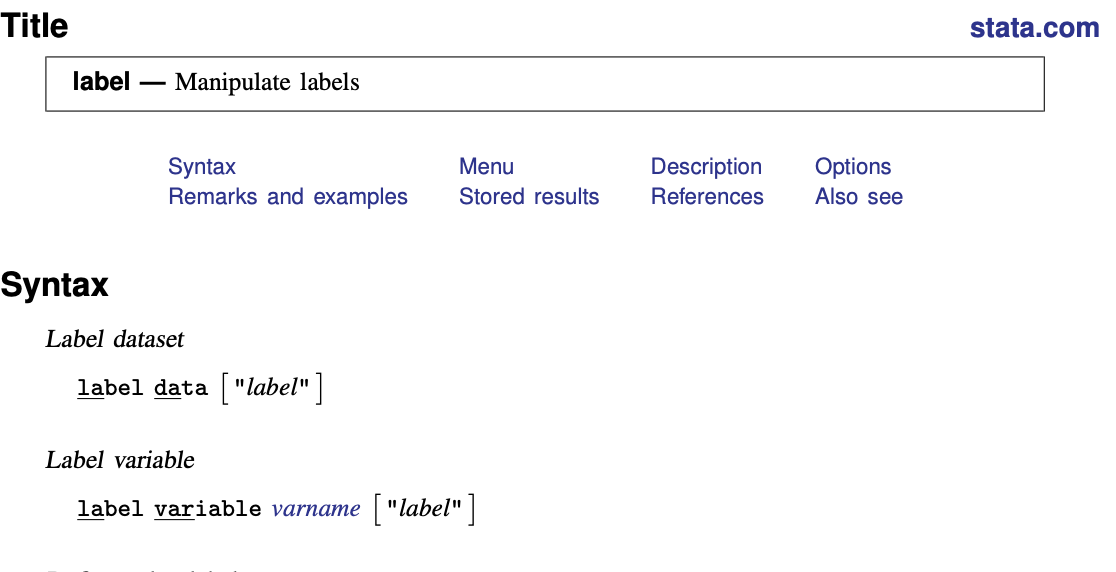


Economics Lesson With Stata
Syntax varname, bwidth(real) invalid syntax r(197);This is how we use asdoc with Stata commands We just add asdoc to the beggining of any Stata command and that's all 2 We used two options of asdoc in the first line of code the replace and title() Replace will replace any existing file with the name Myfiledoc and title will add the specific test as a title to the output file 3Dear Nick, To disagree slightly, the purpose of writing the email to the list was to inform users and to elicit comments and suggestions from list users who might have had this problem I suspected that Patrick Royston might be too busy to address this problem at this time, although I also sent him an email about it I did note that ice had 643 hits in the Stata list archive


Invalid Syntax R 198 Statalist


For Each Loops Invalid Name Statalist
Stata has the convenient feature of having a bootstrap prefix command which can be seamlessly incorporated with estimation commands (eg, logistic regression or OLS regression) and nonestimation commands (eg, summarize)Where the local macro bar is undefined If it comes from rocreg, it would be an error in the code even if it is somehow precipitated by your data, the problem should be detected and an actionable error message givenIn Stata, you do this by typing use one, clear merge 11 id using two Things can still go wrong For instance, id="Bob" will not match id="Bob " (with the trailing blank), but if you expected all the observations to match, you will ultimately notice the mistake


A First Look At The Data Using Stata Sage Research Methods


Wbopendata Stata Module Upgrade
It doesn't seem like he found the solution There is no solution posted or accepted This forum needs to get better at actually solving problems, rather than attempting to pass the buckThe relevant syntax in the ado file that generates this error is initial check that generate () is valid name (will be used as stub) if " generate'"' != "" { * check it is a valid name confirm name generate' * only 1 word allowed if word count generate'' > 1 { di as err "invalid stub generate'" exit 198 }This returns the following error invalid something unmatched close parenthesis or bracket stata() 3598 Stata returned error asdocrest() function returned error function returned error r(3598);



How To Export High Quality Table Of Correlations From Stata To Ms Word Stataprofessor
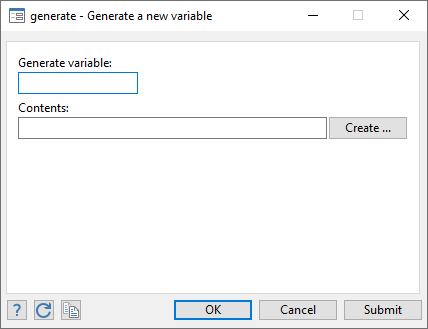


Stata Faq Dialog Programming Part 1 Getting Started
In contrast, the question mark stands for a single character in a variable name But let me refer here to the Stata help at help rename group Older versions of Stata The "tricks and shortcuts" mentioned were introduced with Stata 1 Prior to that, some other commands such as the following were available renpfix male mThe "Invalid data for ZIP in line 44 ," for example, can be identified as the string "EC2A 2HE" (which is a valid London postcode, but invalid data for a numeric variable in a SAS dataset) So, the correct decision (of the IMPORT procedure) at the beginning would have been to read ZIP as a character variableStata Type Mismatch R(109) Stata is right for me?


Error Message Invalid Name Statalist



Kobo To Spss Variable Name And Value Considerations Data Management Kobotoolbox Community Forum
In contrast, the question mark stands for a single character in a variable name But let me refer here to the Stata help at help rename group Older versions of Stata The "tricks and shortcuts" mentioned were introduced with Stata 1 Prior to that, some other commands such as the following were available renpfix male mIF SO THIS MIGHT BE THE PROBLEM YOU MAY NEED TO RETYPE THE APOSTROPHES WITHIN STATA DOEDITOR OR NOTEPAD



A First Look At The Data Using Stata Sage Research Methods



P Programming Manual



Economics Lesson With Stata


For Each Loops Invalid Name Statalist



Stata Wiki Stack Overflow



Andrew Goodman Bacon Many Bugs Fixes Tweaks To Come So Let Us Know How It Works


Random Stata Glitches Statalist



Asdoc Sends Stata Output To Ms Word Stataprofessor


The Stata Blog Excel



Stata Wiki Stack Overflow



How To Export High Quality Table Of Correlations From Stata To Ms Word Stataprofessor


Stata Guide Working With Stata
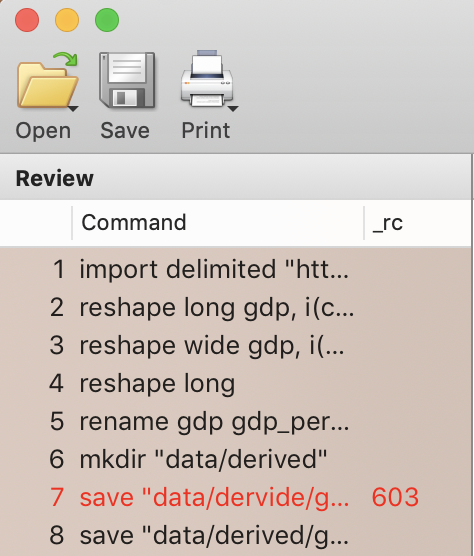


Economics Lesson With Stata


Error Message Invalid Name Statalist


For Each Loops Invalid Name Statalist


Stata Level 2 Tips And Tricks For Working With Stata Stata Basics Passing Commands To Stata Work Flow Navigation Customize Your Stata Information Available In A Stata Dataset Additional Information



How To Run Stata Do File In Vim Stack Overflow
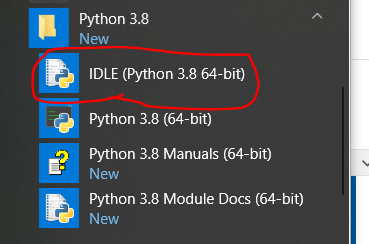


Stata Code Tim Plante Md Mhs
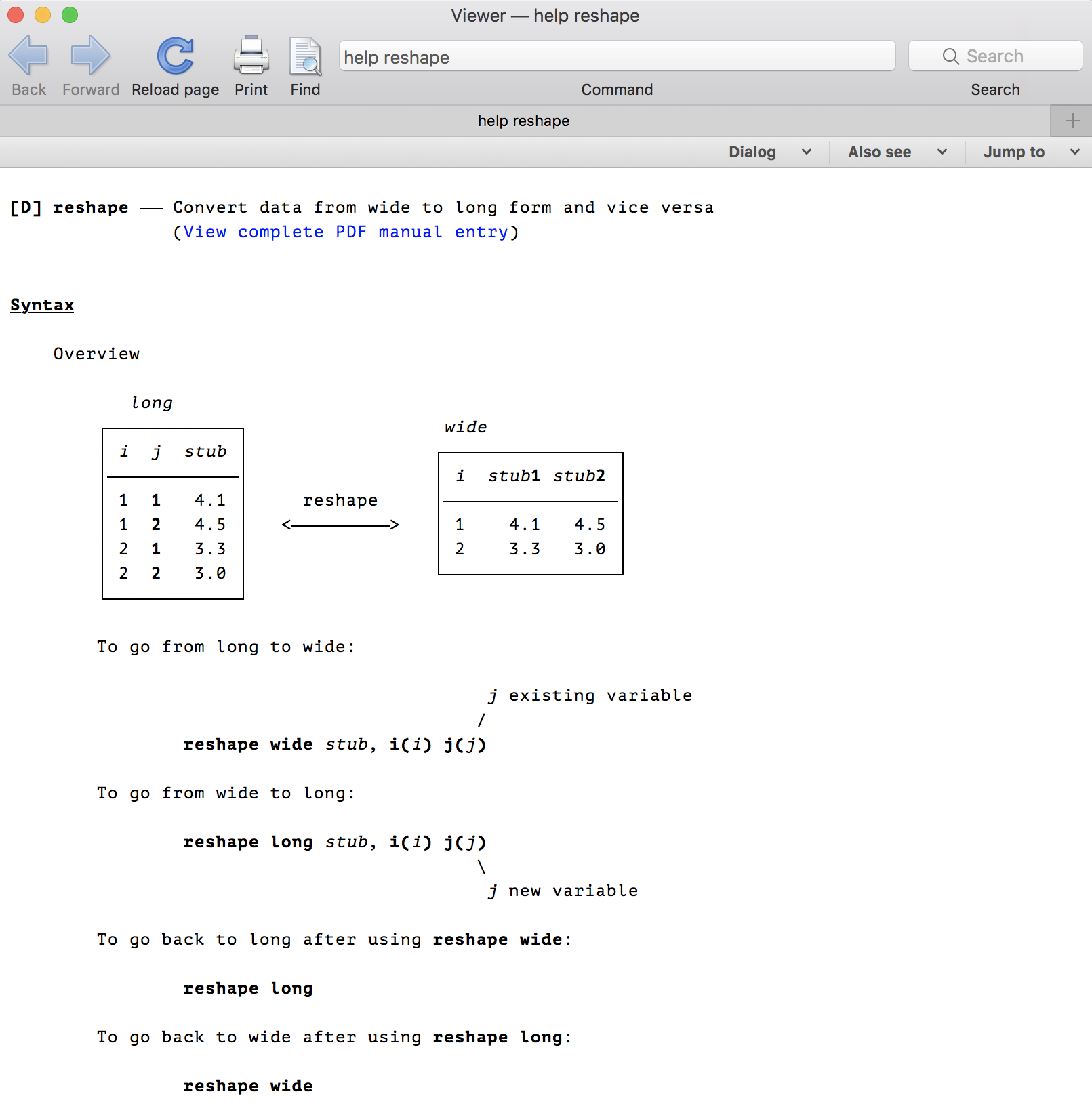


Economics Lesson With Stata



Gr S Website
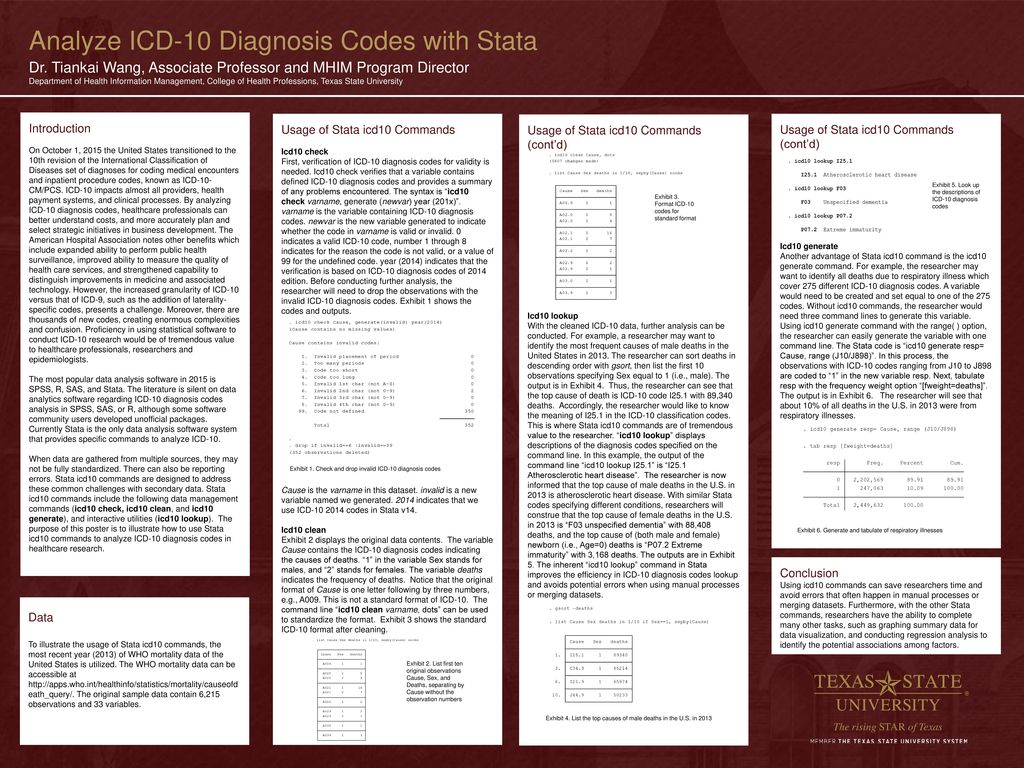


Analyze Icd 10 Diagnosis Codes With Stata Ppt Download


The Stata Blog Export Tables To Excel



Learn About Using Loops In Do Files Foreach In Survey Data In Stata With Data From The European Social Survey 16 Sage Research Methods



190 Questions With Answers In Stata Programming Science Topic


The Stata Blog Using Import Excel With Real World Data
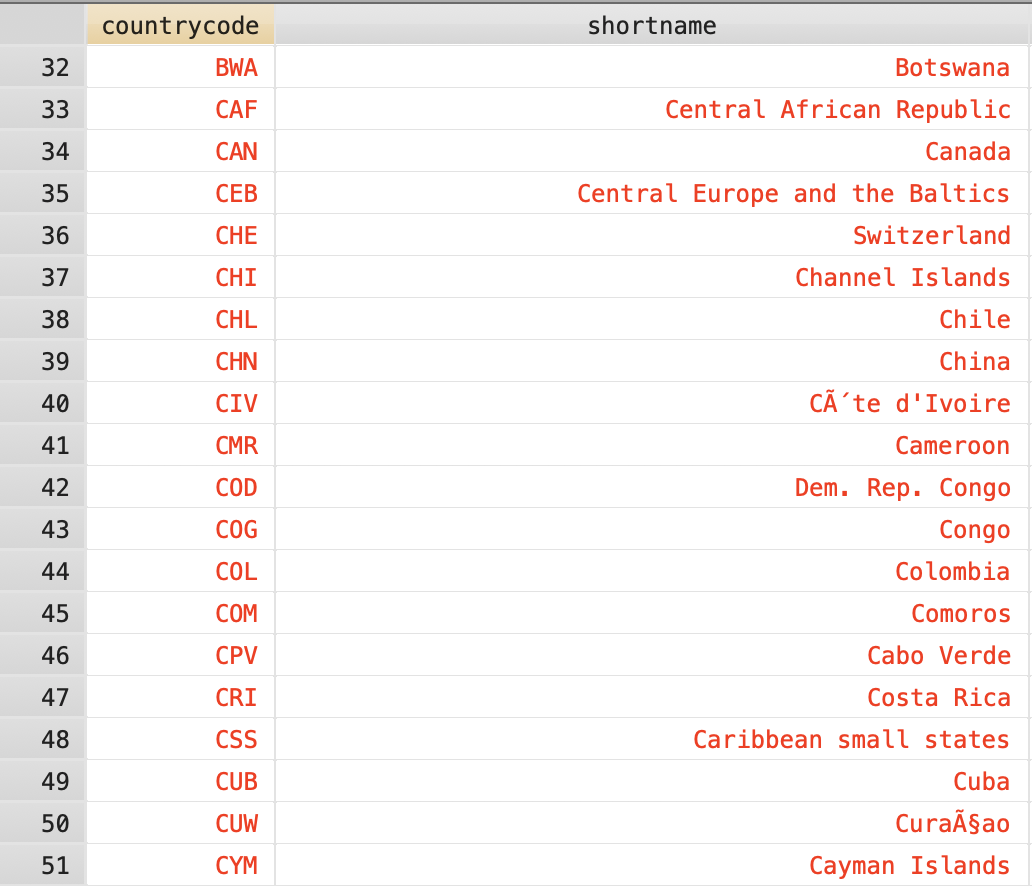


Economics Lesson With Stata



From Kobo To Stata New Solution User Support Kobotoolbox Community Forum



Economics Lesson With Stata
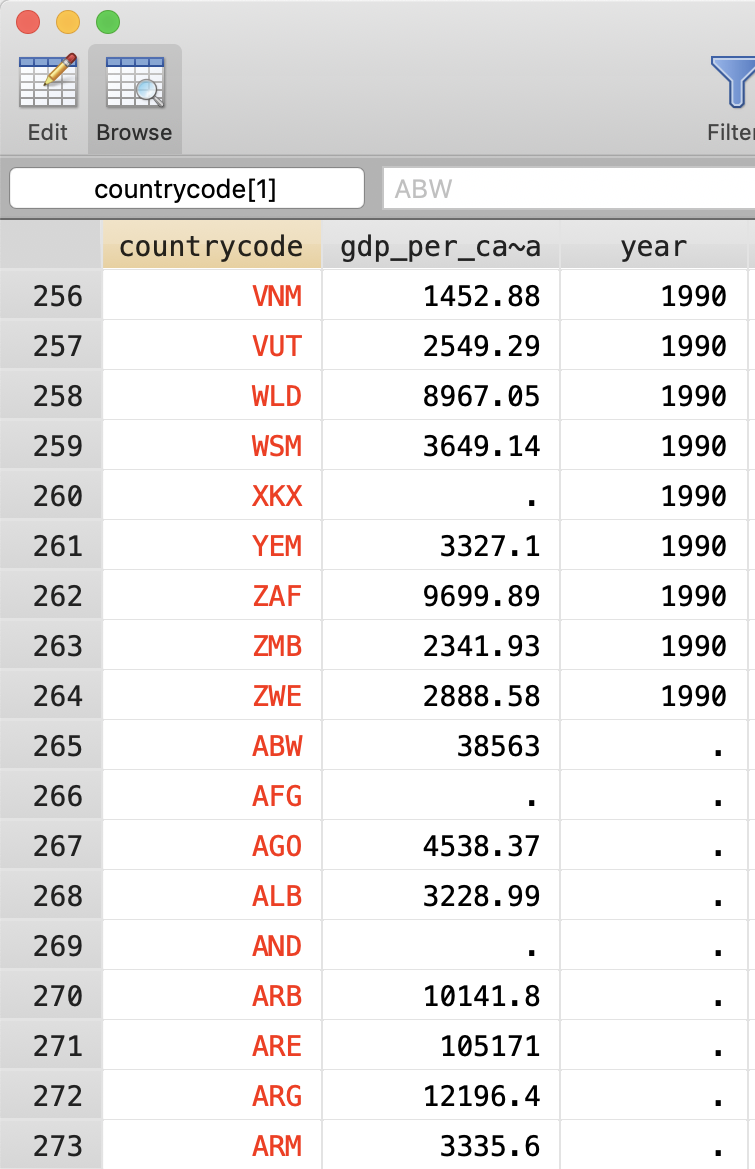


Economics Lesson With Stata


Invalid Name Error Statalist
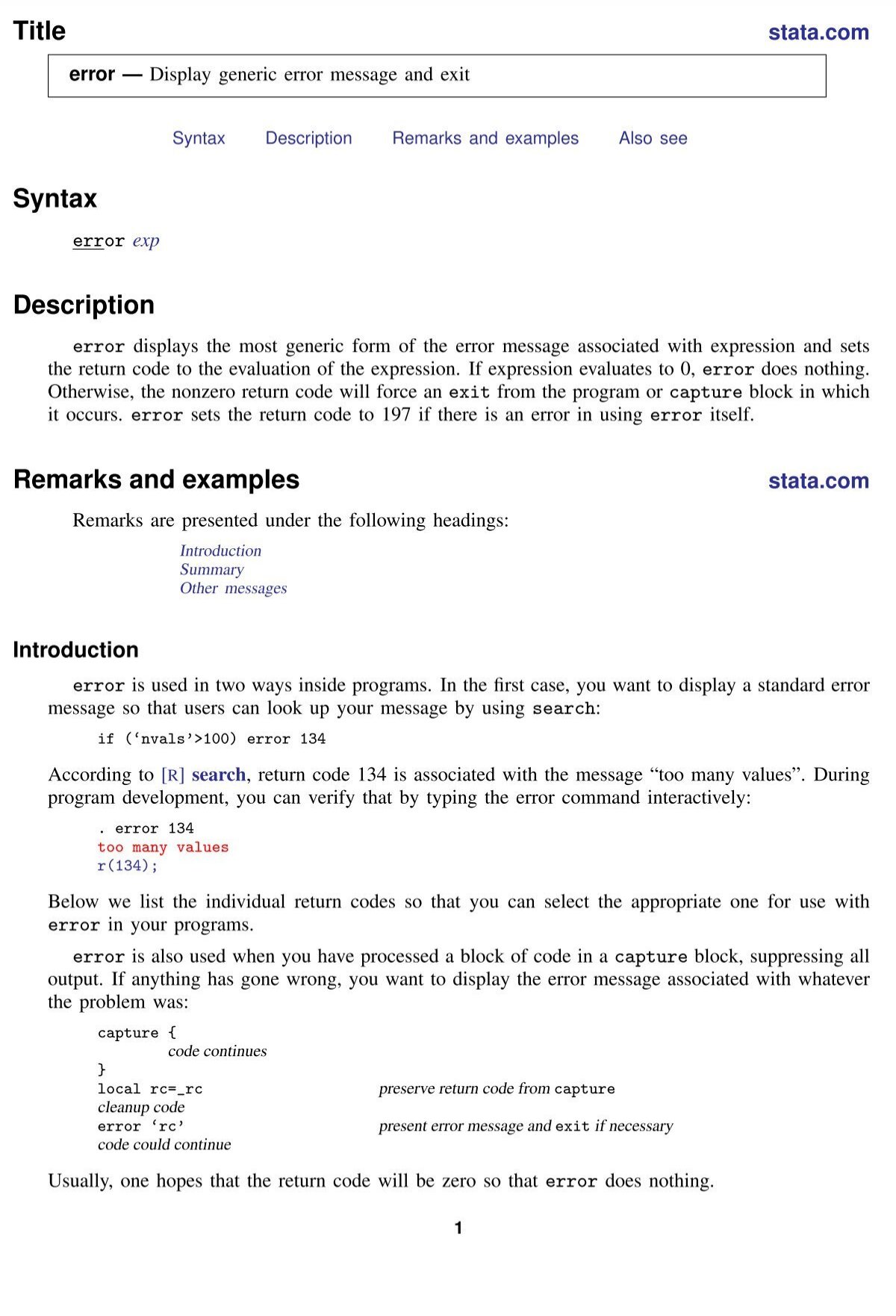


R 1 Stata


Beginner Question Loop Command For Net Returns Error Code R 198 Var Invalid Name Statalist


The Stata Blog Stata 15 Announced Available Now



Importing And Exporting Text Delimited Data Stata



462 Questions With Answers In Stata Software Science Topic


Brant And Ologitgof Returning Error Invalid Name Statalist



Andrew Goodman Bacon Many Bugs Fixes Tweaks To Come So Let Us Know How It Works



A First Look At The Data Using Stata Sage Research Methods



Binary Panel Logistic Regression Xtlogit Fixed Effects Is Not Converging In Stata How To Resolve Cross Validated


Invalid Name Error Statalist



Exporting Ttest Results From Stata To Word Using Asdoc Stataprofessor
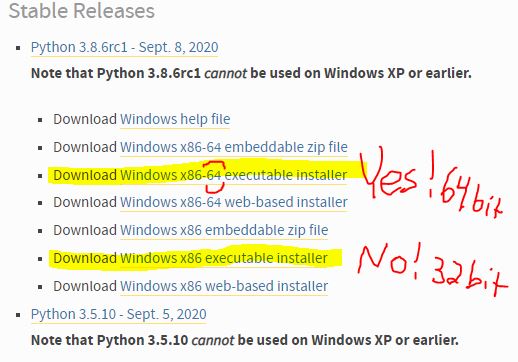


Stata Code Tim Plante Md Mhs


Beginner Question Loop Command For Net Returns Error Code R 198 Var Invalid Name Statalist


Grqreg With Categorical Variables Stata



Learn To Use Two Way Anova In Stata With Data From The News Coverage Index 12 Sage Research Methods



Invalid Syntax Error While Running Scripts Solved In Python Youtube


Wbopendata Stata Module Upgrade
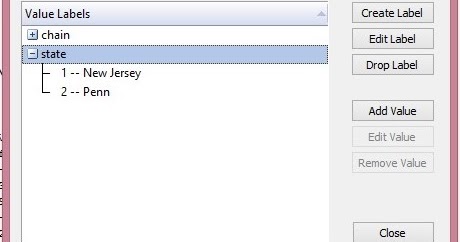


Cruncheconometrix Stata Interpreting One Way Anova Procedure



Parallel Process Stata Python Stack Overflow



0 件のコメント:
コメントを投稿